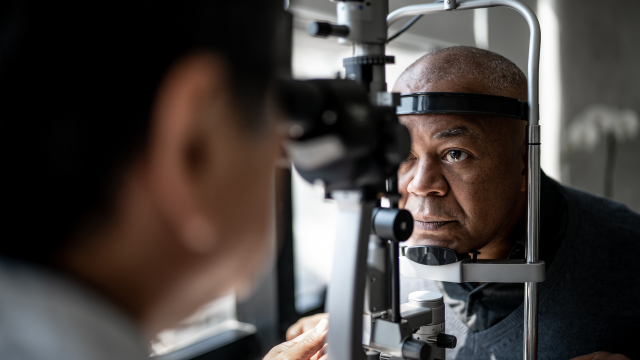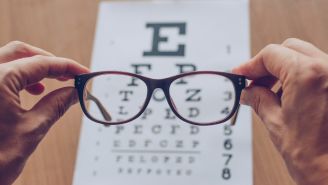Updated on May 1, 2025.
Have you ever noticed a milky-colored buildup in the middle of someone's eye? That's what a cataract can look like in an advanced stage. Earlier on, it may not be so visible to others.
Still, cataracts can begin affecting vision quite early, and millions of people deal with those eyesight changes. In fact, more than 50 percent of adults in the United States get cataracts or cataract treatment by age 80.
The good news: Some simple strategies may improve low vision caused by cataracts, and surgery can help if they become severe.
Cataracts symptoms
Cataracts can only be diagnosed by an eye care professional, such as an ophthalmologist or optometrist. It may be time to schedule an eye exam if you notice any of these common signs:
- Blurry or fuzzy vision
- Trouble seeing at night
- Double vision (single objects appear as two)
- A glow or halo effect around lights
- Changes to color vision (colors are less vivid, maybe brownish)
Causes of cataracts
Certain factors increase the risk of cataracts. For example, if you smoke or drink too much alcohol, your risk of cataracts may be higher. The same is true if you have diabetes, take steroids for health reasons, or your eyes have been exposed to lots of ultraviolet (UV) rays from the sun throughout your life.
Also, the older you are, the higher your risk. And people who have a history of eye injuries are at higher risk of cataracts, as well.
Tips to protect your eyesight
Here are a few lifestyle habits that can help protect your vision and potentially reduce the risk of cataracts:
- Protect your eyes from the sun. Ultraviolet-light-blocking sunglasses and a wide-brimmed hat can help shield your eyes from the sun's damaging rays.
- Kick tobacco. Quitting smoking is one of the best things you can do for your eyes.
- Nourish your eyes. Foods high in certain nutrients may protect your eyesight and reduce the risk of some eye diseases. For example, leafy greens, citrus fruits, sweet potatoes, and carrots contain essential vitamins that support eye health.
- Get screened. Regular eye exams help detect and treat cataracts early. They can also find many other eye problems that can affect your vision.
Cataracts treatments
There are many ways to live better with low vision caused by cataracts. A new eyeglasses prescription may help. So might better lighting. And an eye care professional may be able to recommend other types of eyewear to help with glare and other vision problems.
But if these measures don't work well enough, or if your cataracts severely affect your vision, a simple surgery may help improve your eyesight.
When left untreated, cataracts can drastically affect vision, even causing blindness in some cases. But ultimately, with a little knowledge and information, you can take steps to see better and know when a healthcare provider's help is needed.







